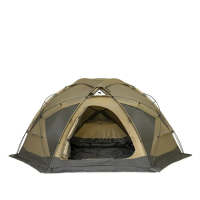Cart
Hiking Tent Essential Tips for Beginners
Heading out on a hiking adventure requires careful planning and preparation, and one of the essential items to consider is a reliable hiking tent. A good tent provides shelter, protection, and a comfortable resting place during your outdoor journey. If you're a beginner hiker looking for guidance on choosing and using a hiking tent, you've come to the right place. In this comprehensive guide, we'll provide you with essential tips to help you make informed decisions and ensure a successful hiking experience. Let's dive in!
1. Understanding Tent Capacity and Weight
Additionally, pay attention to the weight of the tent. As a beginner hiker, it's advisable to opt for a lightweight tent that won't burden you during your hike. Look for tents made from lightweight materials such as nylon or polyester and consider the trade-off between weight and durability.
2. Choosing the Right Tent Design
Consider the weather conditions you're likely to encounter during your hikes and choose a tent design that suits your needs accordingly.
3. Tent Seasonality and Weather Resistance
Consider the climate and time of year you'll be hiking in when choosing between three-season and four-season tents. Opt for a tent that provides adequate weather resistance for your specific hiking needs.
4. Tent Setup and Ease of Use
As a beginner hiker, you'll want a hiking tent that is easy to set up and use. Look for tents with straightforward assembly instructions and color-coded components. Freestanding tents are generally easier to set up, as they don't require stakes for stability. Practice setting up your tent before your hiking trip to familiarize yourself with the process and ensure a smooth experience in the field.
5. Ventilation and Condensation Management
Proper ventilation is essential for a comfortable and condensation-free camping experience. Look for hiking tents with mesh panels and vents that allow for airflow while keeping bugs out. Good ventilation helps reduce condensation inside the tent, preventing the accumulation of moisture and ensuring a dry and comfortable sleeping environment.
6. Tent Durability and Longevity
Investing in a durable hiking tent is important to ensure it lasts through multiple hiking trips. Check the tent's construction, including the quality of the poles, zippers, and seams. Reinforced stitching and robust materials contribute to a tent's durability. Read customer reviews and consider reputable brands known for their quality and longevity.
7. Additional Features and Accessories
- Contact Us
-

About Pomoly
Pomoly is a leading camping brand specializing in hot tents and tent stoves. We are camping life explorer, Follow Page / Join Group, let's make camping enjoyful together!
Working Hours
Mon-Fri, 09:00 - 17:00

- Company Info
- NEWS
- About us
- Pomoly Name
- Leave-No-Trace
- Contact Now
- Facebook Group
- YouTube Learning
- Product News
- Contact Us
- Topic Collections
- Policies & Terms
- Payment Policy
- Shipping Policy
- Return & Refund
- Privacy Policy
- Terms of Use
- Tax Policy
- Website Disclaimer
- Safety Disclaimer
- Warranty Policy
- Promotion Policy
- Pre-order Policy
- INTELLECTUAL PROPERTY RIGHTS
- Dealers Agreement And Terms
- Become Affiliate
- User Center
- Forget Password
- My Orders
- Tracking Order
- My Account
- Register
- Popular Searches
-
Tipi Tents Camping Tent Hammock Stove Camping Camping Pellet Stove Circle 6 Titanium Water TankDome X Locomotive 20 LEO 2 camping tent T-Brick 2.0 T1 2.0 tent stove Dweller wood stove Oroqen 2.0 Chimney Water Tank Lumberjack STOVEHUT Bromance 70 Tipi Pomoly Coupon Baker Oven Stove Titanium elbow Fire Pits Tent Stove titanium Stove Outdoor Pellet Stove
keebon pellet stove







